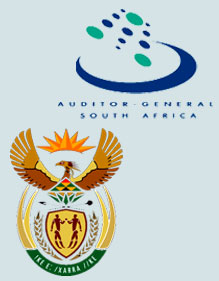
Wasteful expenditure and the flouting of procurement processes in government will continue because there are simply no consequences for errant officials who abuse systems without shame. This is the view of auditor-general Kimi Makwetu, who on Wednesday presented the latest audit report on provincial and national departments in Cape Town.
Makwetu was joined by Cedric Frolick, chairperson of the National Assembly in Parliament. Frolick represented Parliament as an oversight body for the departments audited, and echoed Makwetu’s statements on accountability and the need for action to be taken to correct poor management of public resources.
Irregular expenditure
According to Makwetu, the number of departments that showed improvement in their results grew to 25% from 22% in the previous financial year. This translated into a 3% improvement overall, but irregular expenditure and non-compliance with legislation, said Makwetu, remain at high levels and are a cause for major concern. As many 72% of the entities audited did not comply with key legislation relating to financial management.
Irregular expenditure, explained Makwetu, does not necessarily mean that money was wasted or that fraud was committed, but is an indicator that legislation is not being adhered to, including legislation aimed at ensuring that procurement processes are competitive and fair. It is also an indicator of a significant breakdown in controls at some auditees.
“If auditees improve the key controls that prevent material misstatements in submitted financial statements and non-compliance with supply chain management legislation, these outcomes will improve.”
For the year in question, irregular expenditure totalled R62.7-billion, R29.1-billion (47%) of which was as a result of prior year irregularities identified this year.
Consultants and non-compliance
A total of 39 departments were assisted by private consultants in the compilation of their financial statements. This was done at a cost of R386-million, 76% of which was incurred by only six departments. Departments cited a lack of skills and human resources as reasons for hiring consultants. The trend was most common at national level.
The lack of compliance with legislation, said Makwetu, was not a major surprise because the trend has been a common feature of financial statements they have received from departments over the years.
“A big part of the compliance [required of departments] has a lot to do with procurement-related activities, and if there is no clear transparent process that is governed by regulations when it comes to supply chain, we never know whether they have spent much more than they should have spent, or if they did indeed receive all the goods they ought to have received.”
Performance all round
This is how the 469 departments and entities audited fared:
- 119 received clean audits;
- 238 received unqualified opinions with findings;
- 73 received qualified audits;
- two received adverse opinions;
- 16 received disclaimers.
Disclaimers come about when auditors are given financial statements of such poor quality that they are unable to arrive at an opinion on the financial health of that institution.
These auditees were responsible for a joint budget spend of R1-trillion in the year in question. About a quarter of this, R256-billion, went towards employment costs, while R103-billion was spent on goods and services, R29-billion on capital expenditure and R438-billion on transfer payments.
“Almost 85% of the overall budgeted expenditure of departments is still managed in environments where there was failure to attain a clean audit opinion,” Makwetu said. This, he added, requires decisive steps to be taken as it is within these environments that there is a concentration of irregular, unauthorised and fruitless and wasteful expenditure.
The departments of education, health and public works were among the most vulnerable to qualified and disclaimers, which is concerning, said Makwetu, as these are key service delivery departments. Fifteen departments in these sectors displayed red flags in the financial management area.
“These are key service delivery departments that account for 37% of total spending by departments and must be able to adequately and accurately account for their financial transactions.”
Accountability
Frolick praised Makwetu’s office for the respect it has exhibited towards Parliament and said it is important for the two institutions to work together. “It has become common practice now where officials from the auditor-general’s office interact on a monthly basis with the different parliamentary committees.”
This, he added, has the committees paying specific attention to ongoing expenditure as it occurs. “If committees wait until the end of a financial year to receive a report like this then it will make oversight and holding those accounting officers accountable for what is happening in their departments impossible.”
Committees will be able to see what programmes within departments are causing the negative reporting in financial statements. `
“Unless officials face consequences of wastage and not following the prescripts of legislation that is there, they will continuously repeat the same action.
“You simply ignore everything that is there, and you carry on and at the end of the day you’ll try to fix it so that the AG doesn’t pick it up. It’s a symptom that ultimately will destroy the fibre of certain departments, but also have a negative impact on the social fibre of our country.”
Frolick added that parliamentary committees must focus on who is responsible for this. This, he said, is important, because these officials have a habit of messing up in one department and disappearing, only to resurface again in another department. He called for the naming and shaming method.

